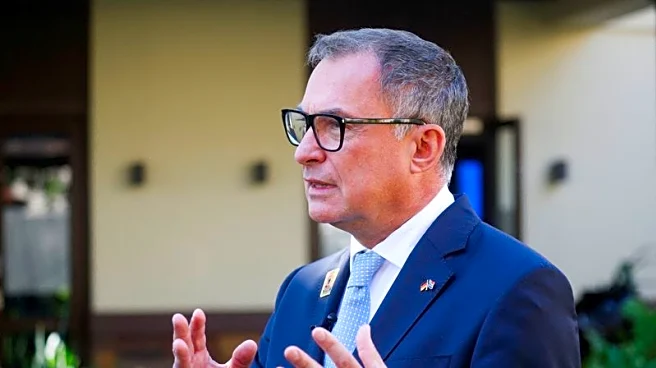What's Happening?
The International Telecommunication Union (ITU), GSMA, and UNHCR are expanding efforts to provide affordable connectivity to refugees in Chad and other African countries. The Connectivity for Refugees
(CfR) initiative aims to mobilize resources to ensure all major refugee hosting areas in Africa have connectivity by 2030. The initiative, launched in 2023, is a private-public partnership active in countries including Chad, Ethiopia, Uganda, Mauritania, Egypt, and Rwanda. UNHCR is seeking at least $20 million in core support and $200 million in direct investment to expand infrastructure and lift regulatory barriers for displaced people.
Why It's Important?
The expansion of the CfR initiative is crucial for improving the quality of life for refugees and host communities by providing access to digital resources and communication. Connectivity can facilitate education, healthcare, and economic opportunities, contributing to the resilience and inclusivity of communities. The initiative aligns with global efforts to address the digital divide and promote sustainable development in refugee-hosting areas. It also highlights the importance of collaboration between international organizations, governments, and private sectors in addressing humanitarian challenges.
What's Next?
The CfR initiative will continue to seek partnerships and investments to expand connectivity infrastructure in refugee-hosting areas. Local mobile operators and international partners are expected to collaborate on infrastructure upgrades and regulatory frameworks to enhance access for displaced people. The initiative may also explore opportunities to integrate refugee needs into broader digital infrastructure projects, leveraging support from development actors like the World Bank and IFC. The success of the initiative could serve as a model for similar efforts in other regions facing humanitarian challenges.
Beyond the Headlines
The CfR initiative reflects the growing recognition of connectivity as a fundamental need for displaced populations. It may influence policy discussions on digital inclusion and the role of technology in humanitarian response. The initiative also highlights the ethical and social dimensions of providing connectivity to vulnerable communities, emphasizing the need for equitable access and sustainable solutions. The collaboration between international organizations and private sectors underscores the potential for innovative partnerships in addressing complex global challenges.










